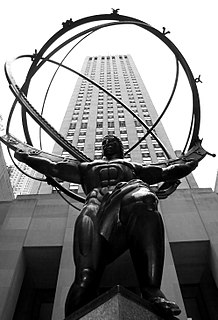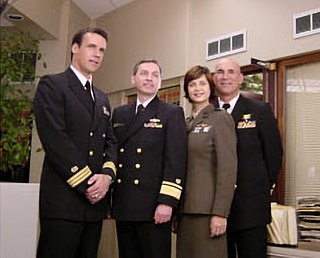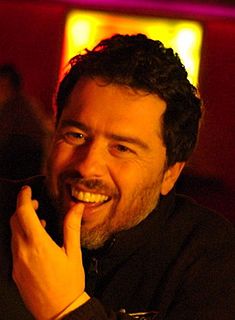A Quote by Jeff Britting
Jumping twenty or so years later, Ann Ciccolella, artistic director of Austin Shakespeare, approached me with the idea of staging Anthem. She had heard my film score to Ayn Rand: A Sense of Life. And she said, I want to do Anthem as an oratorio. Well, I figured what she meant was a straight play with music.
Related Quotes
The idea for Anthem the play began over twenty years ago. I was assisting in the production of another Ayn Rand work, Ideal. I moved to New York and began working on producing the play with my partners. And as a way to raise money to cover some venture debt, we decided to stage Anthem for a limited run at the Lex Theatre in Hollywood.
She'd always known he loved her, it had been the one certainty above all others that had never changed, but she had never said the words aloud and she had never meant them quite this way before. She had said it to him, and she hardly knew what she had meant. They were terrifying words, words to encompass a world.
She was a keen observer, a precise user of language, sharp-tongued and funny. She could stir your emotions. Yes, really, that's what she was so good at - stirring people's emotions, moving you. And she knew she had this power...I only realized later. At the time, I had no idea what she was doing to me.
Insofar as she recognized at all that she was dreaming, she realized that she must be exploring her subconscious mind. She had heard it said that humans are supposed only to use about a tenth of their brains, and that no one was really clear what the other nine tenths were for, but she had certainly never heard it suggested that they were used for storing penguins.
She didn’t understand why it was happening,” he said. “I had to tell her she would die. Her social worker said I had to tell her. I had to tell her she would die, so I told her she was going to heaven. She asked if I would be there, and I said that I would not, not yet. But eventually, she said, and I promised that yes, of course, very soon. And I told her that in the meantime we had great family up there that would take care of her. And she asked me when I would be there, and I told her soon. Twenty-two years ago.
Like I said before, I don't know how helpful Inez will be, " she explained. "She's very eccentric and controlled by her whims. If she likes you, she might tell you something. If she doesn't, well..." Ms. Terwilliger shrugged. "Then maybe we'll have time for photo ops." "Score," said Adrian. When I shot him a look, he added quickly, "But of course she'll like you.
In this moment she felt that she had been robbed of an enormous number of valuable things, whether material or intangible: things lost or broken by her own fault, things she had forgotten and left in houses when she moved: books borrowed from her and not returned, journeys she had planned and had not made, words she had waited to hear spoken to her and had not heard, and the words she meant to answer with. . . .
She was obviously useful at the UN because she had a public persona before she ever got there. She was well known. She was a spokeswoman for many important things. When she got there, what she said was paid attention to, undoubtedly much more than would have been if just Joe Blow had been made our representative to the United Nations. In that sense, I think it was useful to have her there.
My mom is a painter and an artist. She would play music, and she always had very good taste in music, fashion, and art. She was also a young single mom, so I think she had really good style; she was really free... just really inspiring in her own way and allowed me to find the direction I wanted to take in my life.
I went to film school and studied Alfred Hitchcock. I knew of Alma Reville existence, but had no idea really who she was or how influential she was on him. She stayed in the shadows. Go online, and there are hardly any images or film of her. She really stayed out of the limelight on purpose. She didn't want it, and I think that's one of the reasons that she's really lost in the shadows of Hitchcock's history to a degree.




































